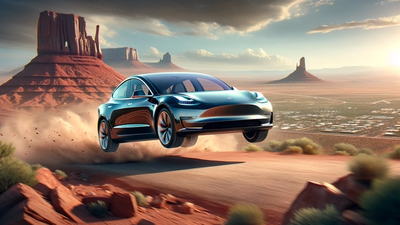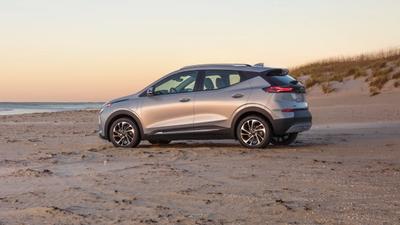Finding the Best Deal on Your EV
Electric vehicles are surging in popularity. Prices are getting lower, the network of public charging stations is growing, and there are more incentives and programs than ever to help encourage more drivers to make the switch to zero-emissions vehicles. However, the sticker prices of EVs are still more expensive than those of their gas-powered counterparts, and these higher upfront costs mean most buyers look to finance their new or used EV purchase through an auto loan.
For many potential EV drivers, the big decision is whether to get your electric car loan through a dealership, bank, or credit union. All three financing options have their own unique pros and cons to consider.
In this guide, we'll break down the key advantages and disadvantages of dealership, bank, and credit union financing for electric vehicles. We'll cover interest rates, convenience factors, special incentives, approval requirements, and more. We’ll also explore how EV Life combines its competitive rates with existing EV incentives to help drivers access and utilize every available dollar that can bring down the price of their new or used EV.
Why go Electric?
With gas prices still high and environmental concerns at the top of many drivers' minds, electric vehicles are continuing their rise in popularity. Buying an EV can help you save a ton of money on fuel costs over the long run while also reducing your carbon footprint. Pretty much a win-win, right? However, the upfront costs of an electric car tend to be higher than comparable gas-powered models, which means most buyers will look to finance their purchase. And that means choosing between multiple lenders to secure financing.
Electric Car Finance Options
There are a variety of car financing options for electric vehicles, but the main options are getting an auto loan through a dealership, a bank, or a credit union. Each path has its own unique pros and cons worth considering. Let’s take a look at some of the benefits and drawbacks of each type of lender.
Is it Better to Get an Auto Loan Through a Dealer, Bank, or Credit Union?
Pros and Cons of EV Financing Through a Dealership
The biggest advantage of dealer financing is convenience. You can browse their EV selection, pick out your dream car, negotiate on price, and get approved for a car loan all in the same place. Many dealer-arranged financing options offer attractive promotions like low APRs (annual percentage rate) or cash incentives when you finance through their captive lender.
However, the convenience of dealership financing often comes at a price—typically in the form of a higher interest rate compared to what you might get when financing a car through a bank or credit union. Dealers mark up rates so they can make a profit on financing. You'll also likely face stricter auto loan terms like lower mileage limits since the dealer hopes to get the car back in decent condition for resale down the road.
Pros
- One-stop shopping convenience for your loan process
- Access to promotional APR deals and incentives
- May approve borrowers with lower credit scores
Cons
- Interest rates tend to be marked up
- More restrictive car loan approval terms (mileage caps, etc.)
- Inventory is limited to the EVs that the dealer has in stock
Pros and Cons of EV Financing Through a Credit Union
Credit unions are another finance avenue for EV buyers to explore. These not-for-profit lenders often provide low interest rates comparable to (or sometimes better) than banks. Credit unions also tend to have more flexible underwriting when it comes to credit scores, employment history, and other approval criteria. Some specialize in eco-friendly loans for EVs or offer promotional financing for electric vehicles.
The catch is you'll need to be an existing credit union member or willing to pay a fee and open an account. Credit unions also generally can't match the large nationwide footprint of major banks, but the rate savings might make up for that minor inconvenience in some cases.
Pros
- Lowest interest rates on the market
- More flexible credit and income requirements
- May offer EV discounts or green auto loans
- Take advantage of exclusive member-only rates
Cons
- Need to join and potentially pay a membership fee
- Smaller geographic footprint than national banks
- Could face funding or staffing limitations
Pros and Cons of EV Financing Through a Bank
Bank financing is a smart option for qualified borrowers who want to secure a competitive interest rate on their electric vehicle. Because they aren't marking up the financing, banks can offer some of the lowest rates, and you may score an even better APR if you already have an existing banking relationship. The approval process also tends to be more flexible than dealerships in terms of income, credit score requirements, and loan term options.
The main downside is having to handle the financing separately from the vehicle purchase. You'll need to get pre-approved first before negotiating at the dealership.
Pros
- Ability to secure very low interest rates
- Potential relationship discounts for existing customers
- Flexible loan terms to fit your needs
- Use pre-approval as negotiating power at dealer
Cons
- Two-step process vs. one-stop dealership financing
- May face stricter approval requirements
- Limited to that bank's dealer network (if any)
Online Lenders for EV Financing
In addition to traditional dealerships, banks, and credit unions, online lenders have emerged as another option for financing an electric vehicle purchase. Online auto financing options operate entirely over the internet without any physical branch locations.
Pros
- Fast loan application approval process
- Advantages of a bank loan with greater flexibility
- Able to pre-qualify and compare rates from multiple lenders
- Flexible credit requirements, easier loan approval for fair/poor credit
Cons
- Some have strict debt-to-income and income documentation requirements
- Higher rates for borrowers with poor credit scores
- Limited term options, many max out at 72-84 months
- Don't get to deal with an in-person lender
While they have some downsides, online lenders provide EV buyers with additional flexibility and leverage. You can get pre-approved with multiple online lenders in a matter of minutes to compare rates and terms. This pre-approval can then be used as a bargaining chip at the dealership.
For those who don't qualify for low rates from a traditional lender, an online lender specializing in fair credit auto loans may be an affordable option. Just watch out for excessive fees or "loan-packing" with overpriced add-on products.
The Best Way to Finance Your Electric Vehicle: EV Life
At EV Life, we specialize in helping EV buyers across the country secure affordable financing for their electric car purchases. We work with a nationwide network of trusted lenders, including top banks, credit unions, and other financing companies.
Our goal is to eliminate the so-called “green premium” and make electric vehicles affordable for everyone. To do this, our finance experts work with you to find and apply for every available incentive you qualify for and bundle those savings into your car loan, substantially lowering your monthly payment for a new or used EV.
With a free EV Life account we help you:
- Maximize your tax credits and rebates. We prequalify your incentives up front and help you apply for all your incentives pre- and post-purchase with our easy-to-use “Turbo Tax-style” incentive filing tools.
- Prequalify for low rate EV loans. Based on the EV you want and your credit score, score a prequalified loan offer that beats traditional loan payments.
- Bundle charging. EV Life can also help you get an instant quote for a home charger + installation – and you can even bundle it into your EV loan.





